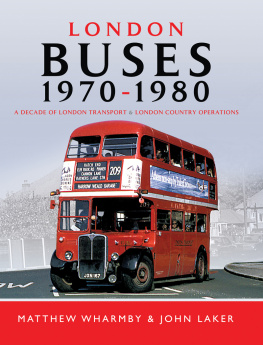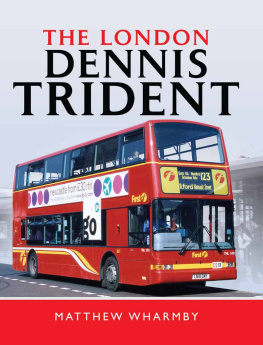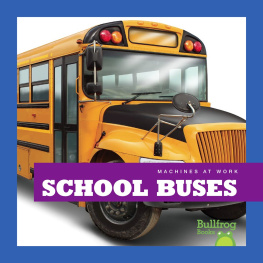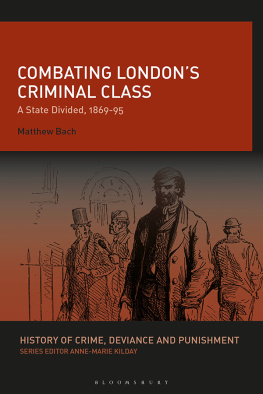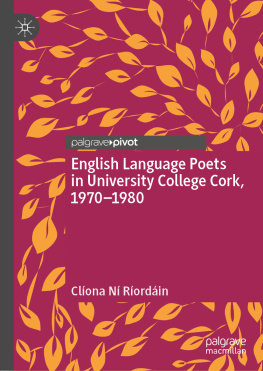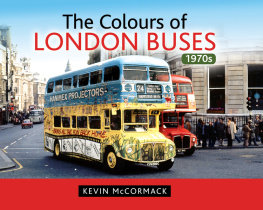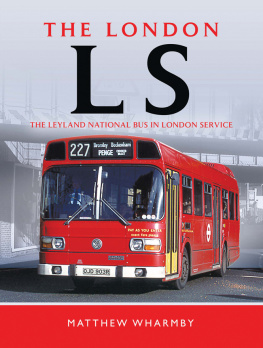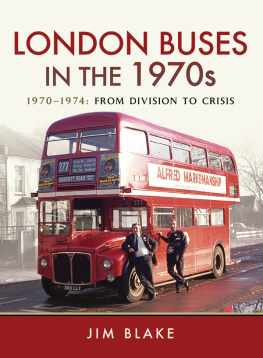Wharmby Matthew - London Buses, 1970–1980
Here you can read online Wharmby Matthew - London Buses, 1970–1980 full text of the book (entire story) in english for free. Download pdf and epub, get meaning, cover and reviews about this ebook. year: 2017, publisher: Pen & Sword Books, genre: Non-fiction. Description of the work, (preface) as well as reviews are available. Best literature library LitArk.com created for fans of good reading and offers a wide selection of genres:
Romance novel
Science fiction
Adventure
Detective
Science
History
Home and family
Prose
Art
Politics
Computer
Non-fiction
Religion
Business
Children
Humor
Choose a favorite category and find really read worthwhile books. Enjoy immersion in the world of imagination, feel the emotions of the characters or learn something new for yourself, make an fascinating discovery.
- Book:London Buses, 1970–1980
- Author:
- Publisher:Pen & Sword Books
- Genre:
- Year:2017
- Rating:5 / 5
- Favourites:Add to favourites
- Your mark:
- 100
- 1
- 2
- 3
- 4
- 5
London Buses, 1970–1980: summary, description and annotation
We offer to read an annotation, description, summary or preface (depends on what the author of the book "London Buses, 1970–1980" wrote himself). If you haven't found the necessary information about the book — write in the comments, we will try to find it.
London Buses, 1970–1980 — read online for free the complete book (whole text) full work
Below is the text of the book, divided by pages. System saving the place of the last page read, allows you to conveniently read the book "London Buses, 1970–1980" online for free, without having to search again every time where you left off. Put a bookmark, and you can go to the page where you finished reading at any time.
Font size:
Interval:
Bookmark:

LONDON BUSES
1970-1980
A DECADE OF LONDON TRANSPORT AND LONDON COUNTRY OPERATIONS
A DECADE OF LONDON TRANSPORT AND LONDON COUNTRY OPERATIONS

MATTHEW WHARMBY AND JOHN LAKER
All photographs in this book were taken by John Laker, the majority with an Agfa Silette camera.
Front cover: The old order of classic London buses is exemplified by Harrow Wealds RT 1139, with upper-case blinds throughout.
Back cover, top: The much-loved low-height RLH class bowed out early in the era covered by this book; RLH 59 of Harrow Weald saw out the 230 with them.
Back cover, middle: The green Country Area buses became the property of London Country, but Green Line endured, at first still with modernised RFs like RF 165.
Back cover, bottom: Aldenham continued to overhaul London Transports buses in the 1970s; this view is of a red Routemaster and a repurchased green RCL coach being treated side by side.
ISBN 978 1 47387 294 3
eISBN 978 1 47387 296 7
Mobi ISBN 978 1 47387 295 0
Published in 2017 by Pen & Sword Transport
an imprint of
Pen & Sword Books Ltd
47 Church Street, Barnsley, South Yorkshire, S70 2AS
Copyright Matthew Wharmby and John Laker, 2017
The right of Matthew Wharmby and John Laker to be identified as the Authors of this Work has been asserted by them in accordance with the Copyright, Designs and Patents Act 1988. A CIP catalogue record for this book is available from the British Library
All rights reserved. No part of this book may be reproduced or transmitted in any form or by any means, electronic or mechanical including photocopying, recording or by any information storage and retrieval system, without permission from the Publisher in writing.
Pen & Sword Books Ltd incorporates the imprints of Pen & Sword Archaeology, Atlas, Aviation, Battleground, Discovery, Family History, History, Maritime, Military, Naval, Politics, Railways, Select, Transport, True Crime, and Fiction, Frontline Books, Leo Cooper, Praetorian Press, Seaforth Publishing and Wharncliffe.
For a complete list of Pen & Sword titles please contact
PEN & SWORD BOOKS LIMITED
47 Church Street, Barnsley, South Yorkshire, S70 2AS, England
E-mail:
Website: www.pen-and-sword.co.uk
D uring the decade of the 1970s Londons buses were subjected to major changes. The two previous decades had been dominated by the standardised RT and RF fleets in red or green, but the familiar London scene was about to change forever.
From 1 January 1970 London Transports Country Area buses were hived off to form London Country Bus Services, a subsidiary of the National Bus Company. This involved the transfer of 28 garages and 1,267 vehicles.
The cost of traditional crew operation had come under scrutiny due to falling ridership and staff availability, and a move to one-man operation (OMO) began in 1964, at first using existing RFs. After an experiment which introduced the first Red Arrow route, a fleet of AEC Merlin single-deckers designed for multiple standee flat-fare operation entered service between 1968 and 1970, followed by the shorter Swifts. When double-deck OMO was legalised, new Daimler Fleetlines (DMSs) began to appear in 1971, starting with route 220. These were not successful in London and were not compatible with London Transports maintenance patterns.
A batch of 164 Scania double-deckers with MCW Metropolitan bodywork were bought in 1975 and were initially crew operated, but a second generation of OMO double-deckers was in the offing, and, in co-operation with British Leyland, the Titan was introduced in 1978 following trials with two prototypes. LT preferred not to be dependent on a single supplier and were pleased when MCW developed the Metrobus as a competitor. The first Metrobuses entered service in 1978 and over 500 had been brought into service by the end of 1980. Leyland National single-deckers replaced some of the Merlins and Swifts from 1976.
In 1977 HM the Queen celebrated 25 years on the throne and the occasion was marked with a fleet of 25 silver-painted Routemasters, temporarily designated SRM. They were launched with a parade at Easter from Hyde Park Corner to Battersea Park via Park Lane, Oxford Street, Regent Street, Whitehall and Westminster Bridge.
In 1979 London celebrated 150 years since the first Omnibus appeared. Again a fleet of Routemasters and one Leyland Fleetline appeared in a commemorative livery, and special events were staged.
1979 saw the end of British Airways Routemaster operation from the West London Air Terminal to Heathrow, patronage of this service having declined due to the extension of the Piccadilly line to the airport.
This publication is a personal record of the changing 1970s scene, including the later years of the RTs and RFs, a study of the Country Area shortly after the transfer of London Transports green buses to London Country and the gradual conversion of the route network to one-man operation. Another fascinating feature is a rare look inside Aldenham Works in 1980, when Routemasters were still receiving full overhauls and repaints.
| Matthew Wharmby | John Laker |
| Walton-on-Thames, December 2016 | Uxbridge, December 2016 |

What better way to start a section on RTs than with a classic roofbox example? By the time of this account, they were very thin on the ground, especially Saunders ones like RT 1317, photographed at Petts Hill, Northolt Park on 17 April 1970; indeed, this would have been one of this buss final appearances.
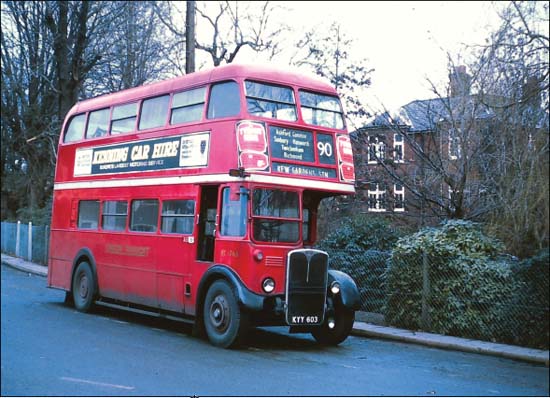
On 3 January 1969 Twickenhams RT 1765 reposes at the time-honoured but now long-gone Staines stand. Twickenham garage would close on 18 April 1970, passing the 90 (and RT 1765) to Fulwell.

Harrow Wealds RT 4123, in Imperial Drive in South Harrow on 31 January 1970, is carrying upper-case via blinds. This stock number would spend eleven years (1964-75) at Harrow Weald, though after overhaul in December 1968 it was a different combination of chassis and body altogether.
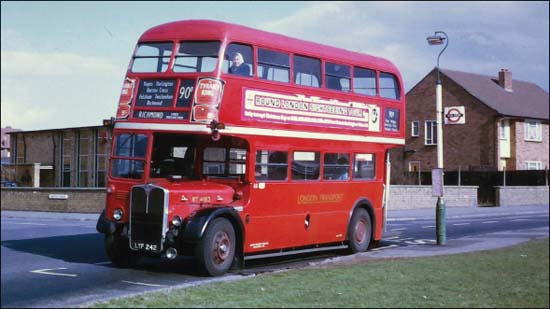
Twickenham-based RT 4183 is caught at the 90Bs Yeading stand on Easter Sunday, 30 March 1970. When Twickenham closed three weeks later, this bus would transfer to Norbiton.
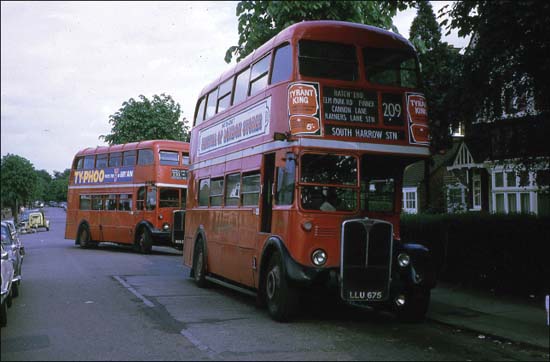
Another classic feature of traditional London buses fast disappearing by the time our account starts was upper-case lettering on via blinds; it may have been perceived as harder to read when comparative studies were carried out by London Transport, but it lent buses a gravitas they have never had since. RT 3876 was based at Harrow Weald between April 1967 and April 1972, and this Northwick Park Station capture of 30 May 1969 puts it in front of an RLH, a class which was not to last much longer.
Font size:
Interval:
Bookmark:
Similar books «London Buses, 1970–1980»
Look at similar books to London Buses, 1970–1980. We have selected literature similar in name and meaning in the hope of providing readers with more options to find new, interesting, not yet read works.
Discussion, reviews of the book London Buses, 1970–1980 and just readers' own opinions. Leave your comments, write what you think about the work, its meaning or the main characters. Specify what exactly you liked and what you didn't like, and why you think so.

